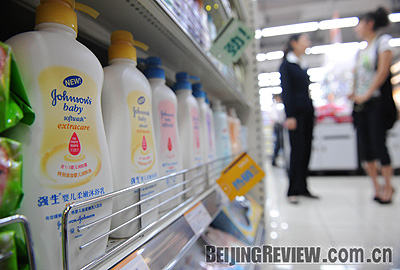| Health-care giant Johnson & Johnson's customer appeal in China took a hit on March 12 when a U.S. consumer advocacy group reported some of the company's baby-care products tested positive for carcinogens.
 |
|
HARMFUL IF USED?: Suspicions about the safety of Johnson & Johnson baby-care products still linger after the media reported numerous cases of allergies on children using the company's products (CFP) | The nonprofit Campaign for Safe Cosmetics (CSC) tested 48 children's products purchased across the United States, finding Johnson & Johnson baby shampoos and baby washes, among other brands, tested positive for cancer-causing formaldehyde and 1,4-dioxane.
The American company set up its first joint venture in China in 1985 and has long been the maker of the most trusted baby-care products in China.
Amid customers' concerns about China-made Johnson & Johnson products, Shanghai-based Nonggongshang Supermarkets Corp., which operates 3,500 stores in east China, pulled the company's products off shelves on March 16. On the Internet and in newspapers, Chinese parents across the country started to complain about their babies developing rashes and allergies.
"I won't use any Johnson & Johnson product on my daughter and I will warn all my friends of the potential danger," said Zhou Yong, the father of a 1-year-old from south China's Guangdong Province. His daughter, he told Beijing Review, suffered from serious facial allergies after using a Johnson & Johnson facial cream in January and recovered only after Zhou took a doctor's suggestion to change skincare products.
To quell the angry parents, the company released a statement through a public relations company, saying infant skin allergies have nothing to do with the poisonous chemicals found in American Johnson & Johnson products. The statement also said the levels at which the chemicals were found in the study are safe.
In response to the study, China's General Administration of Quality Supervision, Inspection and Quarantine (AQSIQ), China's product quality watchdog, released test results on 26 Chinese Johnson & Johnson baby bath products on March 20. Scientists found that all tested products fall within the country's acceptable limits for formaldehyde in cosmetics while one batch number (B081210A/20111209) of baby bath wash contained a slight amount, 3.27 ppm (parts per million), of 1,4-dioxane. An AQSIQ statement said a field inspection at Johnson & Johnson China's production facilities found no addition of formaldehyde or 1,4-dioxane into the products.
Additionally, the agency said, neither China nor the United States has limited trace levels of 1,4-dioxane in skincare products and cosmetics that are generated during the manufacturing process. China has not imported any Johnson & Johnson products since 2008 and all Johnson & Johnson products sold in the country are made in China by Johnson & Johnson China Ltd., the agency said.
The State Food and Drug Administration issued a similar statement on March 21, saying that it did not find Johnson & Johnson China to be adding either formaldehyde or 1,4-dioxane during production of any of the company's 33 baby-care products. The statement quotes a regulation on skincare products by the Ministry of Health, which allows no more than 0.2 percent of formaldehyde in skincare products and forbids any addition of 1,4-dioxane.
The two government statements, both in favor of Johnson & Johnson, have helped the company with its defensive strategy. On March 22, Shanghai-based Johnson & Johnson China held a press conference in Beijing, where its general manager, Wang Meiying, said the company's products are "healthy and safe."
Johnson & Johnson's spokesperson, Lu Jing, said at the press conference that the company had "on average received only 1.17 complaints related to allergies out of 1 million products sold."
"So far, nothing suggests Johnson & Johnson's products cause any allergies," said Johnson & Johnson's Market Research Center Director, Wu Dong.
"The 1,4-dioxane is widely seen in many of our daily goods, such as tomatoes, fresh shrimp and coffee. Shrimp contains 20 to 30 ppm of this compound," he said.
However, Johnson & Johnson's guarantee so far has failed to reassure customers who have sought counsel from Beijing-based lawyer Cui Baoyu to sue Johnson & Johnson China for compensation. Cui told Beijing Review on March 23 that of over 100 children's parents receiving his legal consultation, several had asked him to be their lawyer and had started medical assessment on their children's skin diseases.
"We had waited for government test results that could prove Johnson & Johnson problematic, only to get a disappointing result," said Cui.
Although Nonggongshang supermarkets in Shanghai put Johnson & Johnson products back on shelves on March 20 after AQSIQ's examination, suspicions about their safety still linger. According to an unscientific online survey conducted by Sina.com, which attracted nearly 130,000 participants by March 25, over half of respondents said they no longer have confidence in Johnson & Johnson and around 62 percent said they would not buy Johnson & Johnson products in the future.
| 